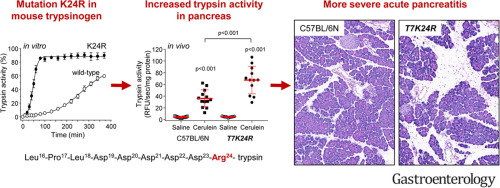当前位置:
X-MOL 学术
›
Gastroenterology
›
论文详情
Our official English website, www.x-mol.net, welcomes your
feedback! (Note: you will need to create a separate account there.)
Mutation That Promotes Activation of Trypsinogen Increases Severity of Secretagogue-Induced Pancreatitis in Mice.
Gastroenterology ( IF 25.7 ) Pub Date : 2019-11-18 , DOI: 10.1053/j.gastro.2019.11.020 Zsanett Jancsó 1 , Miklós Sahin-Tóth 1
Gastroenterology ( IF 25.7 ) Pub Date : 2019-11-18 , DOI: 10.1053/j.gastro.2019.11.020 Zsanett Jancsó 1 , Miklós Sahin-Tóth 1
Affiliation

|
BACKGROUND & AIMS
Mutations in the human serine protease 1 gene (PRSS1), which encodes cationic trypsinogen, can accelerate its autoactivation and cause hereditary or sporadic chronic pancreatitis. Disruption of the locus that encodes cationic trypsinogen in mice (T7) causes loss of expression of the protein, but only partially decreases the severity of secretagogue-induced acute pancreatitis and has no effect on chronic pancreatitis. We investigated whether trypsinogen becomes pathogenic only when its activation is promoted by mutation.
METHODS
We generated mice with knock-in of the p.K24R mutation (called T7K24R mice), which is analogous to human PRSS1 mutation p.K23R. We gave T7K24R and C57BL/6N (control) mice repeated injections of cerulein to induce pancreatitis. Plasma amylase activity, pancreatic edema, and myeloperoxidase content in pancreas and lungs were quantified. We expressed mutant and full-length forms of PRSS1 in Escherichia coli and compared their autoactivation.
RESULTS
The p.K24R mutation increased autoactivation of T7 5-fold. T7K24R mice developed no spontaneous pancreatitis. T7K24R mice given cerulein injections had increased pancreatic activation of trypsinogen and more edema, infiltration of lung and pancreas by inflammatory cells, and plasma amylase activity compared with control mice given cerulein injections. Injection of cerulein for 2 days induced progressive pancreatitis in T7K24R mice, but not in control mice, with typical features of chronic pancreatitis.
CONCLUSIONS
Introduction of a mutation into mice that is analogous to the p.K23R mutation in PRSS1 increases pancreatic activation of trypsinogen during secretagogue-induced pancreatitis. Higher pancreatic activity of trypsin increases the severity of pancreatitis, even though loss of trypsin activity does not prevent pancreatitis in mice.
中文翻译:

促进胰蛋白酶原激活的突变增加了促胰液素诱导的胰腺炎在小鼠中的严重程度。
背景与目的编码阳离子胰蛋白酶原的人丝氨酸蛋白酶1基因(PRSS1)中的突变可加速其自身活化并引起遗传性或散发性慢性胰腺炎。小鼠中编码阳离子胰蛋白酶原的基因座(T7)的破坏导致蛋白质表达的损失,但仅部分降低了促分泌素诱导的急性胰腺炎的严重性,并且对慢性胰腺炎没有影响。我们调查了胰蛋白酶原是否仅在突变促进其激活时才成为致病菌。方法我们产生了敲入p.K24R突变的小鼠(称为T7K24R小鼠),与人PRSS1突变p.K23R相似。我们给T7K24R和C57BL / 6N(对照)小鼠重复注射cerulein诱导胰腺炎。血浆淀粉酶活性,胰腺水肿,定量检测胰腺和肺中的髓过氧化物酶含量。我们在大肠杆菌中表达了PRSS1的突变体和全长形式,并比较了它们的自激活作用。结果p.K24R突变使T7的自激活增加了5倍。T7K24R小鼠未发生自发性胰腺炎。与注射铜蓝蛋白的对照小鼠相比,注射铜蓝蛋白的T7K24R小鼠的胰蛋白酶活化和更多的水肿,炎症细胞对肺和胰腺的浸润以及血浆淀粉酶活性的胰脏活化增强。注射2天的铜蓝蛋白在T7K24R小鼠中诱发进行性胰腺炎,但在对照小鼠中则没有,具有慢性胰腺炎的典型特征。结论将类似于p的突变引入小鼠。PRSS1中的K23R突变会增加促分泌素诱导的胰腺炎期间胰蛋白酶原的胰腺活化。胰蛋白酶的较高胰腺活性会增加胰腺炎的严重程度,即使胰蛋白酶活性的丧失并不能预防小鼠的胰腺炎。
更新日期:2019-11-19
中文翻译:

促进胰蛋白酶原激活的突变增加了促胰液素诱导的胰腺炎在小鼠中的严重程度。
背景与目的编码阳离子胰蛋白酶原的人丝氨酸蛋白酶1基因(PRSS1)中的突变可加速其自身活化并引起遗传性或散发性慢性胰腺炎。小鼠中编码阳离子胰蛋白酶原的基因座(T7)的破坏导致蛋白质表达的损失,但仅部分降低了促分泌素诱导的急性胰腺炎的严重性,并且对慢性胰腺炎没有影响。我们调查了胰蛋白酶原是否仅在突变促进其激活时才成为致病菌。方法我们产生了敲入p.K24R突变的小鼠(称为T7K24R小鼠),与人PRSS1突变p.K23R相似。我们给T7K24R和C57BL / 6N(对照)小鼠重复注射cerulein诱导胰腺炎。血浆淀粉酶活性,胰腺水肿,定量检测胰腺和肺中的髓过氧化物酶含量。我们在大肠杆菌中表达了PRSS1的突变体和全长形式,并比较了它们的自激活作用。结果p.K24R突变使T7的自激活增加了5倍。T7K24R小鼠未发生自发性胰腺炎。与注射铜蓝蛋白的对照小鼠相比,注射铜蓝蛋白的T7K24R小鼠的胰蛋白酶活化和更多的水肿,炎症细胞对肺和胰腺的浸润以及血浆淀粉酶活性的胰脏活化增强。注射2天的铜蓝蛋白在T7K24R小鼠中诱发进行性胰腺炎,但在对照小鼠中则没有,具有慢性胰腺炎的典型特征。结论将类似于p的突变引入小鼠。PRSS1中的K23R突变会增加促分泌素诱导的胰腺炎期间胰蛋白酶原的胰腺活化。胰蛋白酶的较高胰腺活性会增加胰腺炎的严重程度,即使胰蛋白酶活性的丧失并不能预防小鼠的胰腺炎。











































 京公网安备 11010802027423号
京公网安备 11010802027423号